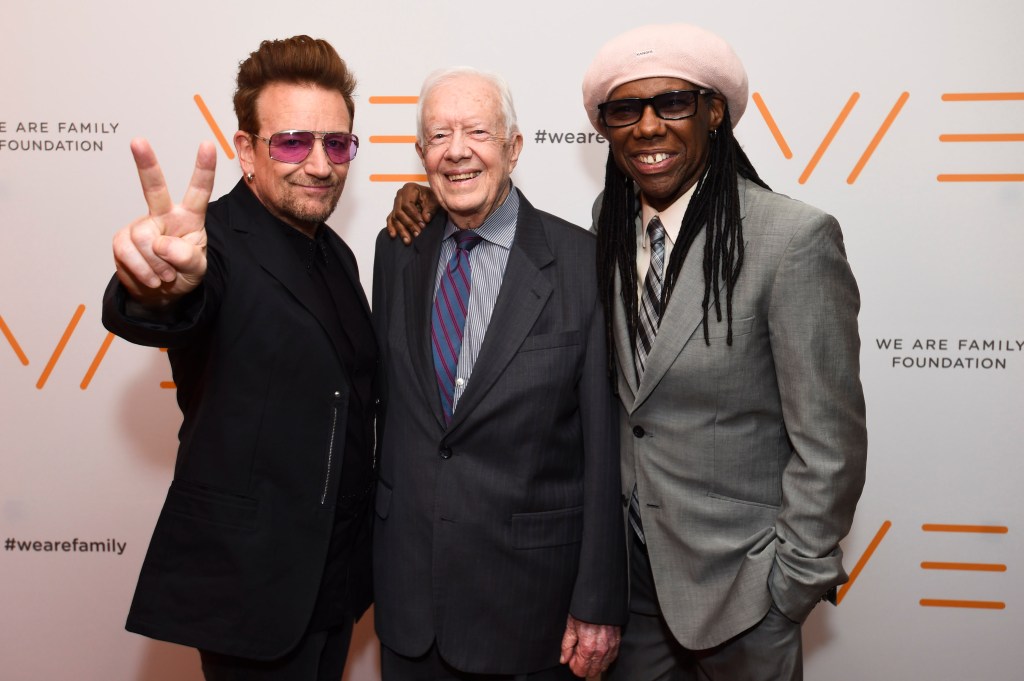Film documents former president Jimmy Carter’s connection to music
Published 2:30 am Thursday, October 8, 2020

- Bono of U2, former president Jimmy Carter and Nile Rodgers photographed together at the We Are Family Foundation 2016 Celebration Gala in New York.
Toward the end of the documentary film, “Jimmy Carter, Rock & Roll President,” U2 frontman Bono reads a poem from the former president’s book, “Always a Reckoning, and Other Poems.” The poem includes a line that not only defines the film’s story, but quite possibly Carter’s raison d’etre: “I learned from poetry that art is best derived from artless things.”
“The greatness of Jimmy Carter can sometimes be in his simplicity in a way,” Mary Wharton, the film’s director, said recently from Pennsylvania.
Trending
“And I love the way that (Bob) Dylan kind of brings it to that when he describes Carter as a simple kind of man and compares it to the Lynyrd Skynyrd song, which is one of my favorite moments in Dylan’s interview. … Things were very clear to Jimmy Carter, it seems like, even things that are very big ideas like the meaning of faith and Christianity, and even his approach to complex subjects like politics and geopolitical maneuverings. He saw things very simply and had a very clear view of right and wrong.”
“Jimmy Carter, Rock & Roll President,” a film that examines Carter’s deep connection to rock, gospel, country, jazz and other genres of music through 22 interviews with the former president, his son, Chip Carter, Gregg Allman, Dylan, Bono, Willie Nelson, Madeleine Albright, Nile Rodgers and many more, will screen at the BendFilm Festival on Thursday evening as a drive-in offering at Deschutes Brewery.
The film, produced by Chris Farrell and Dave Kirkpatrick and written by Bill Flanagan, is the result of three years of intensive research, and includes rare archival footage of performances on the campaign trail by The Allman Brothers Band, Jimmy Buffett and more, as well as White House performances by Dizzy Gillespie, Herbie Hancock and Sarah Vaughan.
Wharton, daughter of musician Bill “Sauce Boss” Wharton, is known for directing a number of music documentaries for VH1 Legends, including the Grammy-winning “Legends: Sam Cooke.”
She collaborated on the film with longtime friend Farrell, who got the idea while working on an Allman Brothers Band documentary. While looking for financing for that film, he was pointed in the direction of two former Carter aides in the White House, Tom Beard and Peter Conlon.
“They started telling me stories about the Allman Brothers, Jimmy Carter,” Farrell said. “I got up to leave, I got what I needed. And then they said, ‘Well, do you want to hear about Bob Dylan?’ I said, ‘Sure, that’d be great.’ And then again, I was like, OK, that’s enough surely. And then they said, ‘Well, what about Willie Nelson?’”
Trending
The stories excited Farrell, and he reached out to Wharton. She also was surprised by Carter’s rock ’n’ roll bona fides.
“I had done a lot of research into music history over the years, and I had done a lot of documentaries about different bands,” Wharton said. “I worked on a television show for VH1 early in my career that was all about the 1970s, and so I had, I thought, a really good familiarity with the classic rock ’n’ roll stories of that era. And so when I learned about this, I was kind of like, ‘Wow, this is pretty interesting.’ I figured that if I didn’t know about this story and this aspect of Jimmy Carter, that there would probably be a lot of other people that also didn’t know.”
As Carter states at the top of the film during his interview, “It was the Allman Brothers (who) helped put me in the White House by raising money when I didn’t have any money.” Gregg Allman in the film describes meeting a shirtless Carter holding a big bottle of Scotch at the Georgia governor’s mansion (a claim that Carter disputes in the film, as he only indulged in one drink per day).
Despite Gregg Allman’s arrest on drug charges during Carter’s campaign, Carter stood by the musician against the advice of his staff, and invited Allman to be one of the first guests at Carter’s White House.
Likewise, Carter had close personal friendships with Nelson and Dylan, who both sit for interviews in the film. Wharton and Farrell were able to land the interview with the famously reticent Dylan thanks to Flanagan, who had interviewed the seminal folk-rock artist before.
“I think that having Bill on board gave them (Dylan and his manager) a certain comfort level about it, but I also think that it really comes down to Dylan’s respect for Jimmy Carter,” Wharton said. “When Dylan was asked to accept an honor from the organization that awards the Grammys — The National Academy of Recording Arts and Sciences wanted to give Dylan a Person of the Year Award (in 2015). And Dylan said he would only do it if Jimmy Carter was the one that presented him with the award. And Carter was very proud of that.”
A segment about how Jimmy Buffett helped Carter’s campaign by playing a rally in Portland may be of particular interest to Oregon audiences. Wharton struggled to find footage of the rally Buffet talked about in his interview until she unearthed a short snippet of the singer’s acoustic performance from a TV station’s archives.
“It was labeled as Portland, Oregon, so I knew it was the right city, and I didn’t know what the actual date of the Buffett rally was,” she said. “But this said, ‘Carter rally with folk singer.’ … There was nothing digitized, I couldn’t look at it. I just saw that little brief description and I was like, we’re going to pay to have this film transferred — because it was on film — just to see what’s on there. We got the film back and not only is it Jimmy Buffett, the film is beautiful and it’s exactly the day that he’s talking about.”
Carter’s election in 1976 came at a tumultuous time in American history, as the country strived to pull itself out of the Watergate scandal.
Wharton and Farrell saw a historical connection to today’s political environment.
“The movie business is really pretty much in the toilet,” Wharton said. “But we wanted to push ahead and get this out because we felt like it had a really relevant message that was also really positive, that hopefully can remind people of some of the great American values that Jimmy Carter stood for and that this country should stand for again. … Jimmy Carter was a truth-teller. You know, that great slogan from Superman, ‘Truth, justice and the American Way’ — we could use a little bit more of that these days.”








